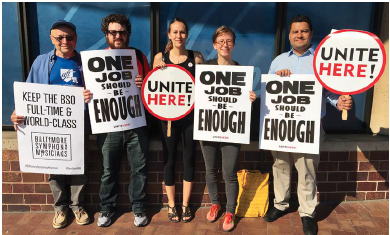As Baltimore Symphony Musicians continued to picket Joseph Meyerhoff Symphony Hall, emails released pursuant to a Freedom of Information Act request revealed Baltimore Symphony Orchestra (BSO) management attempted to influence Maryland Governor Larry Hogan to attach to any release of state funds a message supporting the management bargaining position seeking drastic cuts in musician compensation. As reported by the Baltimore Sun on July 16, these messages also show BSO management painting a very dark picture of the organization’s finances to the governor’s office, suggesting that management might have privately undermined public efforts then underway by the musicians and their supporters to get the governor to release to the BSO $1.6 million in funding authorized by the state legislature.

The emails show that BSO CEO Peter Kjome believed, as early as May 23, that the funds would not be released, although Gov. Hogan did not announce his decision until July 3. On that same day, BSO musicians continued a 40-plus-year tradition of playing a Fourth of July concert at Oregon Ridge Park, having assumed responsibility for the event after BSO management canceled the orchestra’s summer season on May 30. In conjunction with Baltimore County government, the musicians obtained grants from the Music Performance Trust Fund and Film Funds to present this live, free performance. This year’s concert was conducted by Amarillo Symphony Orchestra Music Director Jacomo Bairos.
The musicians, members of Local 40-543 (Baltimore, MD), are routinely joined on the picket line by the orchestra’s subscribers and donors, members of other AFM locals, and members of other unions, such as the International Alliance of Theatrical Stage Employees (IATSE), the International Brotherhood of Electrical Workers (IBEW), the Baltimore Teachers Union (BTU), the United Food and Commercial Workers International Union (UFCW), the American Federation of Teachers (AFT), UNITE HERE, the American Guild of Musical Artists (AGMA), the American Federation of State, County and Municipal Employees (AFSCME), National Nurses United (NNU), and the Baltimore and Maryland State AFL-CIO leadership.
On June 24, former BSO Music Director David Zinman and his wife Mary visited the picket line, as did former International Conference of Symphony Musicians (ICSOM) Chair Bruce Ridge. “I was shocked, mortified, and horrified to hear what was happening,” Zinman said. “It pains me to see this.” Among his remarks, Ridge observed, “What happens to one of us happens to all of us.”
A number of BSO musicians have been hired to play in other orchestras’ summer seasons and in summer festivals. The musicians remaining in Baltimore are busy playing home concerts and other types of performances to raise awareness and money for their fight for a fair contract. Baltimore Symphony Musicians took part in a rally on July 20 at Johns Hopkins Hospital in support of nurses engaged in an organizing drive.
Support for the Baltimore Symphony Musicians and the Musicians’ Association of Metropolitan Baltimore continues to flood in from orchestra musicians and AFM locals across the country. ICSOM has announced that over a quarter of a million dollars has been raised since their Call to Action was announced at the AFM Convention in June.



